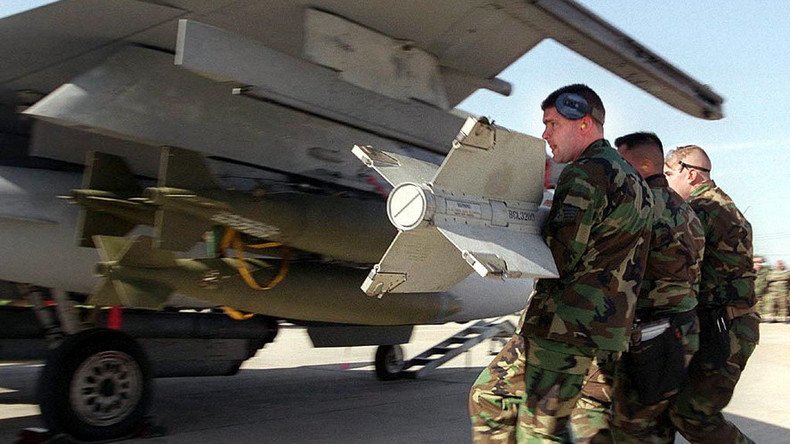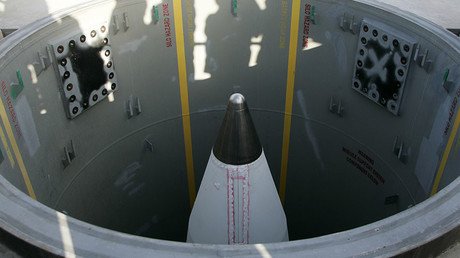US nukes in Turkey vulnerable to ‘terrorists & other hostile forces’ – think tank

A US think tank has called for the withdrawal of nuclear arms from Turkey’s Incirlik Air Base, saying the country is in disorder and is too close to the Syria conflict zone.
The report prepared by the Stimson Center nonprofit think tank, titled ‘B61 Life Extension Program: Costs and Policy Considerations’, questions the safety of American nuclear weapons stored at Turkey’s Incirlik Air Base.
The failed military coup in Turkey on July 15 resulted in the base’s commander being arrested over alleged participation in the agitation.
Turkish authorities blocked the Incirlik base off completely, cutting the facility’s electric power and prohibiting any aircraft from flying in or out of the airfield.
“From a security point of view, it’s a roll of the dice to continue to have approximately 50 of America’s nuclear weapons stationed at Incirlik Air Base in Turkey, just 70 miles from the Syrian border,” said report co-author Laicie Heeley. “These weapons have zero utility on the European battlefield and today are more of a liability than asset to our NATO allies,” said Heeley, a fellow with the Budgeting for Foreign Affairs and Defense program at the Stimson Center.
New deterrence: US plans to upgrade its nuclear bombhttps://t.co/6pCQsYXauvpic.twitter.com/T19jSUcQ1T
— RT America (@RT_America) August 2, 2016
The US brought tactical nuclear bombs to Europe and Turkey in 1950s and 1960s, allegedly to deal with Soviet tank armies that it was feared would pour onto the European battlefield in the event of World War III.
Most of the American nuclear arsenals were retracted from Europe in the early 1990s after the fall of the USSR, yet an estimated 180 obsolete nuclear B61 drop bombs are still stored at six European air bases in NATO member states Belgium, Italy, Germany, the Netherlands, and Turkey.
The development of modern missile air defenses have nullified the A-bomb’s potential, as no bomber would be allowed to approach, let alone fly over, enemy territory.
Still, the US National Nuclear Security Administration plans to spend $US8 billion to extend service of an estimated 480 out of a total 800 B61 bombs the US still has in stock, the report says. These expenditures are planned within the framework of a 30-year, $1-trillion program, as Washington intends to modernize the American nuclear triad.
“These bombs are ill-suited for modern warfare and incredibly costly,” said Stimson Center co-founder and report co-author Barry Blechman.
The report suggests the “immediate removal” of all B61 nuclear weapons from Europe and discontinuation of the procurement of B61s. In this way the Pentagon would save over $6 billion which could be used to bolster the US military presence in Europe.
“The smart move would be to remove these weapons from Europe and double down to strengthen conventional forces that actually protect our NATO allies,” Blechman proposed.
In an article published on August 11, the former Director for Defense Policy and Arms Control on the White House National Security Council, Steve Andreasen, wrote that the B61 tactical nuclear weapons stored at Incirlik have become a hot potato rather than geopolitical argument.
“What if the Turkish base commander at Incirlik had ordered his troops surrounding the perimeter of the base to turn their guns on the US soldiers that reportedly guard US nuclear storage bunkers there?” said the former top White House arms control official.
The ex-White House weapons chief suggested other hair-raising scenarios involving the Incirlik nuclear arsenal.
For example, nationalistic Turks suspicious of the US role in the recent coup might display anti-American sentiment, similar to the Iranians in 1979, and seize the Incirlik base.
Pentagon, State Dept. evacuating Americans from #Turkeyhttps://t.co/S5C0G2WboUpic.twitter.com/V7RZIJvgTK
— RT (@RT_com) March 29, 2016
The proximity of the base to the Syrian border – where a war between international jihadist groups and the government of President Bashar Assad is raging for the sixth year – is another factor. The Pentagon already ordered all military families out of Incirlik and southern Turkey back in March over terrorism-related security concerns, recalls Andreasen.
“There are no do-overs in history, but there are lessons,” Andreasen concluded.














